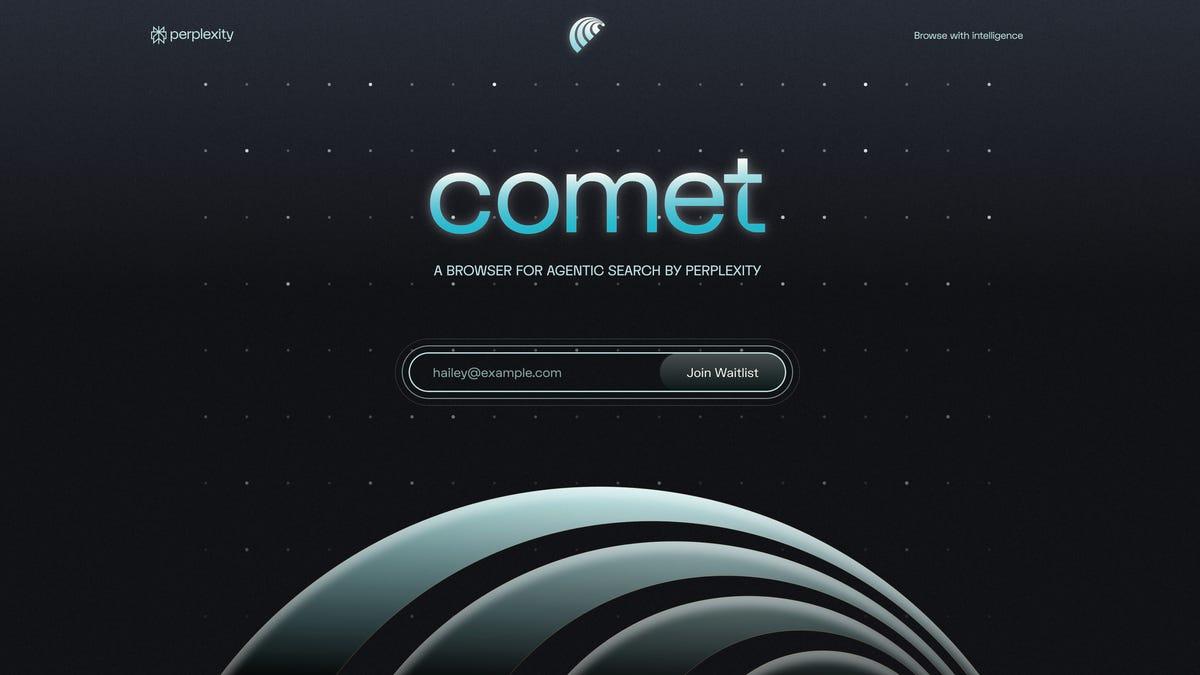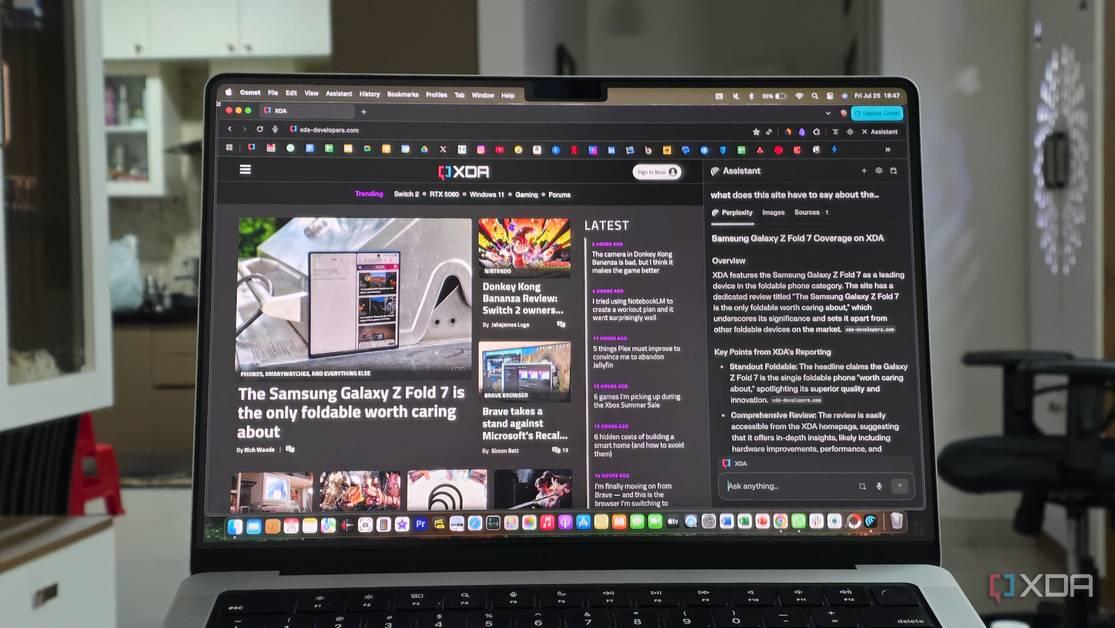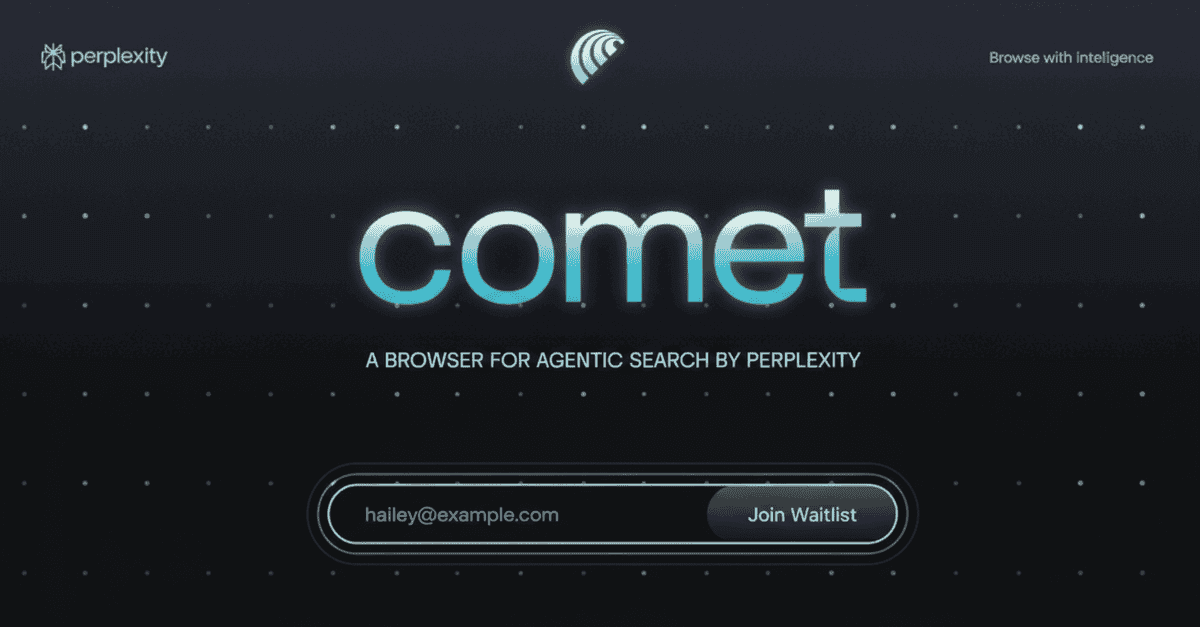Comet AI Browser: Revolutionizing Web Browsing with Intelligent Assistance
3 Sources
3 Sources
[1]
I switched from Chrome to Perplexity's Comet -- here's 7 reasons why you should too
Not only is AI changing the way we search, but it's also changing the way we use the internet in general. That's the goal behind Perplexity's recent AI browser, Comet, designed to function like a digital co-worker, rather than software. Instead of simply displaying webpages, it helps you read, research, write, and even take action online. If you've heard of ChatGPT Atlas, you probably know by now that it's only available to Mac users, so Comet feels like its more accessible cousin. It's based on a similar concept, where it puts an agentic assistant at the centre of your browsing experience, only Comet is available to all. And while browsers like Chrome and Edge are quickly integrating AI tools like Gemini and Copilot, respectively, Comet proudly sets itself apart, having had AI baked into its software from birth, combining logic, search, and automation into a streamlined interface. Having used Comet myself since its launch, here are seven features that made me switch from Chrome to Perplexity's AI assistant, and why it might just be a harbinger of future browsing. 1. Agentic AI assistant The main benefit of an AI browser, whether it be Perplexity Comet or ChatGPT Atlas, is the built-in AI assistant. These are often called Agents, and can complete tasks on your behalf. This could involve asking Comet to find you a table at a posh restaurant nearby, searching the internet for the best price on a new pair of shoes, or finding all of the details you need for an upcoming holiday. For example, I asked Perplexity Comet to 'Plan a three-day trip to Lisbon in January with hotel options near the city center, flight prices from New York, and a simple itinerary.' This kind of request shows exactly what makes Comet's Agentic AI different from searching on a regular browser. Instead of giving me a list of travel sites, it immediately provided direct links to travel blogs, hotel booking sites, and airline sites. It then proceeded to shortlist well-reviewed hotels, a summary of flight prices, and a simple yet effective itinerary. It completed its search result with recommendations as well, indicating Comet recognises intent and not just keywords. It combines search, organization, and activity planning, which felt like interacting with a real virtual assistant. 2. Multi-modal intelligence Perplexity is in a unique position in the world of AI in that it doesn't actually have its own AI model. Instead, both Comet and the Perplexity AI chatbot use the models of other well-known AI companies. For example, while using Comet, you can choose whether the browser is being powered by GPT-5, Claude 4, or another popular option. This gives more control to any users who have a preference. Or, if you have absolutely no preference, it will make the decision for you. You can even jump between models while you work. For example, I asked it, "Using GPT-5, write a persuasive opening paragraph arguing that electric cars are the future of transportation. Then switch to Claude 4 and write a more balanced version. Finally, have Gemini Pro summarize both in one paragraph." As you can see, Comet was able to represent how each model approaches tone and reasoning. GPT-5 is confident and direct, Claude is nuanced and thorough, and Gemini will seamlessly combine the two. It works because it shows you how each model thinks differently, giving you three unique takes on the same topic, instead of just one. 3. Smart summaries If you've ever opened a YouTube video and thought "I'll just watch a minute," and lost half an hour instead, Comet comes to the rescue. Its built-in AI can pull all the key moments from almost any video or article in seconds. For instance, I pasted a link for a Taylor Swift interview and asked for a summary. It returned with a structured summary from the interview, detailing several moments as it recognised notable talking points from her latest album launch, Swift's recent tour, and her engagement announcement. It demonstrates how the browser can take something as casual and human as a two-way interview, loaded with personality, and condense it into a focused overview. You still get the highlights and tone of the conversation, without having to watch the video in its entirety. You can also do this with any article that you are looking through. Simply click the summarize button in the top right-hand corner of the assistant, and it will automatically summarize a page for you. 4. Cross-tab actions Shopping online can be overwhelming as our options seem endless now, but Comet turns it into a guided experience. For instance, I recently asked it to "find the best electric bikes under £1000." The assistant scanned the best websites and shortlisted several webpages, providing a variety of sites to choose from with direct links. It then elaborated by providing a top ten list of 'the best electric bikes under £1000 available in the UK, combining value, performance, and user reviews as of 2025,' followed by 'features to consider.' It also compiled all of the information into one table, based on model, type, price, features, and range, allowing me to scan key statistics more efficiently. This felt like I was managing an intelligent agent, browsing for me, rather than me doing the browsing myself. 5. Context-aware sidebar In an age where misinformation spreads fast, Comet can help you separate fact from fiction. I pasted a link to a recently published news story about Grokipedia, and it responded by cross-checking the claim against credible sources and showed results directly in the sidebar, which is a great way to demo real-time context awareness. It launched an 'accuracy assessment' and displayed reputable publications that echo the vital information. It explored the story's propaganda, statistics, and verified claims. Happy with the results, it responded: "The Tom's Guide article provides an accurate, well-sourced overview of the Grokipedia delay and surrounding controversies, though readers should note the 45% statistic specifically relates to AI news responses rather than all AI-generated content." 6. Discover Sometimes you don't even need to search, Comet brings the world's trending stories to you. From Entertainment and Sports, to Finance and Tech, the Discover feature allows me to click the default topics, or search my own, and check the latest news within each industry, similar to browsing a news website. Ultimately, it serves a daily digest for any given topic, complete with illustrations, story synopses including source links, and a sidebar with the day's market outlook and weather. 7. Templates Finally, Perplexity Comet is as much a chatbot as it is a browser. This is one of the big areas that sets it apart from Google. If you need a helping hand from an expert assistant, the Spaces tool will be essential. When you open Comet, you'll be taken to a home page, which is the Perplexity chatbot. On the left-hand side is a button called 'Spaces'. Here is a variety of templates that can upgrade Comet in a way that works for you. You can use a website scanner tool, which will search any page and allow you to ask questions on it, you can turn it into a trip planning expert or have it take control of your finances. Some of these templates utilise the agent and search functions of Comet, and some focus on the chatbot exclusively. These can be a really fun way to upgrade your browsing experience if you don't know where to start. Overall, the prompts I used demonstrate how Comet can do anything from efficiently planning a holiday, and summarising a dialogue from an interview, to scanning a story for accuracy, and offer product suggestions without extra clicks. Follow Tom's Guide on Google News and add us as a preferred source to get our up-to-date news, analysis, and reviews in your feeds. Make sure to click the Follow button!
[2]
7 things I can do with Comet that you can't with Chrome
I have been using Comet as my daily browser for the past few months. For the most part, it's much like Google Chrome, which is expected, as it's based on Google's open-source Chromium engine. You can browse the web, read your emails, watch YouTube, shop online, and have access to all the extensions on the Chrome Store. But unlike Chrome, Comet can automate most of these tasks with a single prompt that you can save as a Shortcut. Comet can help you summarize and compose your emails, organize your calendar, find specifics from a long YouTube video, look for the best deals and add them to your cart, and even create a Spotify playlist. It can do things no other browser can -- and Chrome doesn't even come close. Perplexity Comet OS Windows, macOS Developer Perplexity Comet by Perplexity AI is a Chromium-based browser with an agentic AI-assistant built in, offering instant question-and-answer search, tab organisation, email summaries, and task automation. It's designed to help you browse smarter and faster and tackle life's admin seamlessly. Price model Free Download Comet Expand Collapse More than search, it can guide you through the steps Comet can help you with the technical process with a step-by-step guide Comet's biggest advantage is its Assistant feature, which sets it apart from Chrome and Edge. Comet's Assistant integrates directly with Perplexity's answer engine, and one specific use case where this really shines is helping you through technical setup and troubleshooting. For example, when setting up Ollama, a local LLM model that works with BrowserOS, I needed help installing a different language model (Mistral:7b-instruct) to a non-default location. Initially, I tried to make sense of the Ollama and BrowserOS documentation, but it was immediately clear that it would take me hours to search through them. Instead of searching through multiple forums and documentation pages, I turned to Comet's Assistant. It clearly guided me through adding a new environment variable in the system settings, then running the two commands in the terminal to download and install the LLM model, and another to start the Ollama local server on http://localhost:11434. When things got complicated, I added more context with screenshots and finally got it working with BrowserOS. With Chrome, you'd have to manually search through resources, open multiple tabs, and piece together information from different sources. Comet searches through the internet and prepares a quick guide in no time. More importantly, for complex projects, you can point the Assistant to official documentation and ask it to guide you through the process in a novice-friendly way. This turns complex technical jargon that only experts understand into accessible content that anyone can follow. Add context to content Drag to select and ask Comet can instantly add context to the content you're reading. When browsing the web, if you come across a reference that doesn't make sense on its own, you can ask for an explanation. Comet scans the current web page, recent developments, and historical events to provide the missing context. For example, if you're watching a movie review on YouTube and the comments refer to someone or something that doesn't make sense, you can drag to select the comment and ask Comet's Assistant to explain what it's about. I find this most handy on X (formerly Twitter), YouTube, and Reddit, where things fly right and left without anyone bothering to add context. I can speak to Comet Voice mode for hands-free work One feature I highlighted when I wrote about how Comet changed the way I browse the web is its voice mode. It works much like the search Assistant in Perplexity's mobile app, but comes with additional functionality in Comet. Press Alt + Shift + V to launch voice mode and start speaking. You can ask it to open a website, find a YouTube video, do a quick calculation, find places, do a quick search, or use it as an assistant to chat. The difference between this and Chrome's voice search is that Comet's voice mode can take actions on your behalf, and not just search for information. Summarize long-form content Extract key information from pages and videos Comet's ability to summarize content goes beyond what Chrome offers. It works seamlessly with web pages and has particularly impressive YouTube integration. While watching a video, Comet can summarize the entire video, find specific timestamps where topics are mentioned, and extract the full transcript. This saves you from watching a 30-minute tutorial just to find that one command you need. The Assistant understands context across different types of content. It can pull out product recommendations from review videos, extract key points from educational content, or identify action items from meeting recordings. Since it's built into the browser, it works on any website you can access, bypassing the AI-blocking measures some sites use against external crawlers. Daily task automation Shortcuts and tasks Comet's automation capabilities turn repetitive tasks into single commands. Through shortcuts, you can create custom commands for tedious and repetitive tasks. For example, I have set up a shortcut /update-sheet with the instructions to find my completed tasks in Asana and then update the Completed Tasks Worksheet in Google Docs. You'll need to connect both your Asana and Google accounts for this to work. When I need to update my sheet, I type /Update-sheet, and Comet will navigate between tabs, pull data from Asana, and update my worksheet, all without supervision. The Tasks feature takes this further by scheduling recurring actions. I have tasks that check my Asana task list every morning, scan for Amazon price drops twice a week, and compile tech news summaries every evening. Chrome can't do any of this without third-party extensions that often don't talk to each other. With Comet, these automations are native features that work across any website you're logged into. Organize and interact with tabs Organize and group similar tabs One simple but handy feature is Comet's tab management -- something Chrome lacks. You can ask it to organize your tabs by topic, close inactive ones, or rearrange them based on your current project. When you restore a session, it remembers not just which tabs were open, but their groups and organization, too. Even better, you can reference any open tab directly by typing @tabname, without having to switch to it. For example, say you're deciding between a YubiKey 5 series and the more affordable YubiKey Security Key NFC. Instead of comparing them manually, you can open their Amazon product pages and review articles in separate tabs, then simply ask Comet to compare them for you. It will compare the products, prepare a summary, and tell which one fits your requirements the best. Automate shopping and find the best deals Automated shopping, price comparison, and coupon finder Comet turns online shopping from a manual hunt to an automated process. It can compare prices across different stores, automatically find and apply coupon codes, and track price histories without you installing multiple extensions. When you're on a product page, Comet can search for the same item on other sites and tell you where it's cheapest. Comet can also manage your cart across sessions. You can ask it to add items that meet specific criteria, check your Subscribe & Save subscriptions on Amazon, or even cancel orders. It remembers what you were shopping for and can alert you to price drops on items you've viewed. Another handy use case was having it auto-fill passenger details on a flight booking portal. There were nine passengers, and I had to enter complete information from names to date of birth to passport details. I could do it manually, but booking flights for nine people is stressful. I uploaded an Excel sheet and let it handle the form-filling while I focused on getting everything else right. It was a slow process, but it did an exceptional job filling in the details. Comet can do a whole lot more Comet brings Perplexity's answer engine and the agentic capabilities to a Chrome-like browser. Unlike an AI in a sidebar like Chrome's Gemini integration, Comet can take control of your browser and automate repetitive tasks to free up some time. Yes, there are trade-offs. The browser uses more resources than Chrome, and privacy concerns are real when you're giving an AI access to your accounts. But for productivity gains, Comet delivers on its promise. While Chrome remains a solid browser, Comet gives a peek into the future of web browsers.
[3]
3 Perplexity Comet AI Browser Workflows for Smarter Browsing
What if you could delegate your most tedious tasks to an intelligent assistant that not only executes them flawlessly but also learns and adapts to your needs? Enter Perplexity's Comet, a new AI-powered browser that transforms how we interact with the internet. Imagine automating your inbox, scheduling meetings, analyzing market trends, or even synthesizing complex data, all with a few prompts. By combining Agentic AI with intuitive task automation, Comet offers a glimpse into a future where workflows are no longer a burden but a seamless extension of your creativity and focus. Yet, as with any innovative tool, it raises an intriguing question: how far can we trust AI to handle the intricacies of our professional and personal lives? Below Ali H. Salem takes you through three standout ways the Comet AI browser can transform your workday, from streamlining competitor analysis to acting as your personal business analyst. Along the way, you'll uncover how features like prompt chaining and web summarization can amplify efficiency while addressing the tool's inherent limitations. Whether you're a professional juggling multiple projects or a curious individual eager to embrace AI-driven productivity, Comet offers a unique toolkit to reimagine your daily workflows. But as we delve into its capabilities, one question lingers: is this the future of work, or just the beginning of a larger transformation? Comet is an AI-powered browser that merges the functionality of a search engine with advanced task execution capabilities. It offers two primary interaction methods: a chat interface for direct communication and an assistant for automating tasks. By using Agentic AI, Comet enables users to perform complex operations such as data collection, workflow automation, and information synthesis. Key features include: These features make Comet a versatile tool for both personal and professional use, offering a powerful combination of automation and intelligence to simplify daily tasks. Comet's practical applications span a wide range of domains, making it a valuable tool for diverse tasks. Here are three prominent use cases: By addressing these use cases, Comet demonstrates its ability to adapt to various professional and personal needs, making it a valuable tool for users seeking to optimize their workflows. Gain further expertise in AI browsers by checking out these recommendations. Beyond its primary use cases, Comet offers additional functionalities that can simplify everyday tasks and enhance productivity. These include: Comet's ability to chain prompts and schedule tasks further amplifies its utility, allowing users to automate repetitive processes and focus on higher-value activities. Additionally, its web summarization and validation tools ensure that the information you rely on is both concise and accurate, reducing the time spent on manual research. While Comet offers impressive capabilities, it is not without its challenges. Task execution can occasionally be inconsistent, with delays or errors arising from complex workflows or ambiguous prompts. To achieve optimal results, users must refine their prompts and actively monitor workflows. Additionally, Comet requires a certain level of technical understanding, making it less accessible for individuals unfamiliar with AI tools. Another limitation lies in its reliance on internet connectivity and external data sources, which may affect performance in environments with restricted access or unreliable networks. These factors highlight the importance of understanding Comet's limitations to maximize its effectiveness. As with any AI-powered tool, privacy and security are critical concerns when using Comet. Its access to browser history, open tabs, and sensitive data introduces potential risks, such as malicious prompt injection, where attackers exploit the browser's capabilities for unauthorized actions. To use Comet safely, consider the following precautions: By adhering to these best practices, you can mitigate risks and use Comet more securely, making sure that its benefits outweigh potential vulnerabilities. Comet is particularly well-suited for individuals engaged in personal projects, skill development, and exploratory tasks. Its ability to automate workflows and synthesize information makes it a valuable tool for students, researchers, and professionals seeking to optimize their productivity. However, it may not be ideal for sensitive or corporate environments without thorough compliance checks and security measures. For those willing to invest time in learning its features and refining their workflows, Comet offers a unique opportunity to explore the potential of AI-driven tools. By adapting its capabilities to your specific needs and remaining mindful of its limitations, you can unlock its full potential and enhance your productivity in an increasingly AI-integrated world.
Share
Share
Copy Link
Perplexity's Comet, an AI-powered browser, is changing how users interact with the internet by offering intelligent assistance, task automation, and enhanced productivity features.
Introducing Comet: The AI-Powered Browser
Perplexity's Comet is revolutionizing the way we browse the internet by integrating artificial intelligence directly into the browsing experience. This innovative browser, based on Google's open-source Chromium engine, combines the familiar interface of traditional browsers with advanced AI capabilities, offering users a powerful tool for enhanced productivity and streamlined web interactions
1
2
.
Source: Geeky Gadgets
Key Features of Comet
Agentic AI Assistant
At the heart of Comet is its built-in AI assistant, capable of completing complex tasks on behalf of the user. From planning trips to finding the best deals online, the assistant can handle a wide range of requests with impressive efficiency
1
.Multi-modal Intelligence
Comet stands out by allowing users to choose between different AI models, including GPT-5, Claude 4, and others. This flexibility enables users to leverage the strengths of various AI systems for different tasks
1
.Smart Summaries
One of Comet's most practical features is its ability to generate concise summaries of web content, including articles and videos. This functionality saves users time by extracting key information from lengthy materials
1
2
.Cross-tab Actions
Comet excels in managing multiple tasks across different tabs, making it particularly useful for online shopping and research. The browser can compare options, provide recommendations, and even add items to shopping carts
1
.Enhancing Productivity and User Experience
Voice Mode for Hands-free Operation
Comet's voice mode allows users to interact with the browser using voice commands, enabling hands-free browsing and task execution
2
.Related Stories
Content Contextualization
Users can select text on any webpage and ask Comet to provide additional context or explanations, enhancing comprehension of complex topics
2
.Workflow Automation
Comet's ability to chain prompts and automate repetitive tasks significantly boosts productivity. Users can create custom workflows for various professional and personal needs
3
.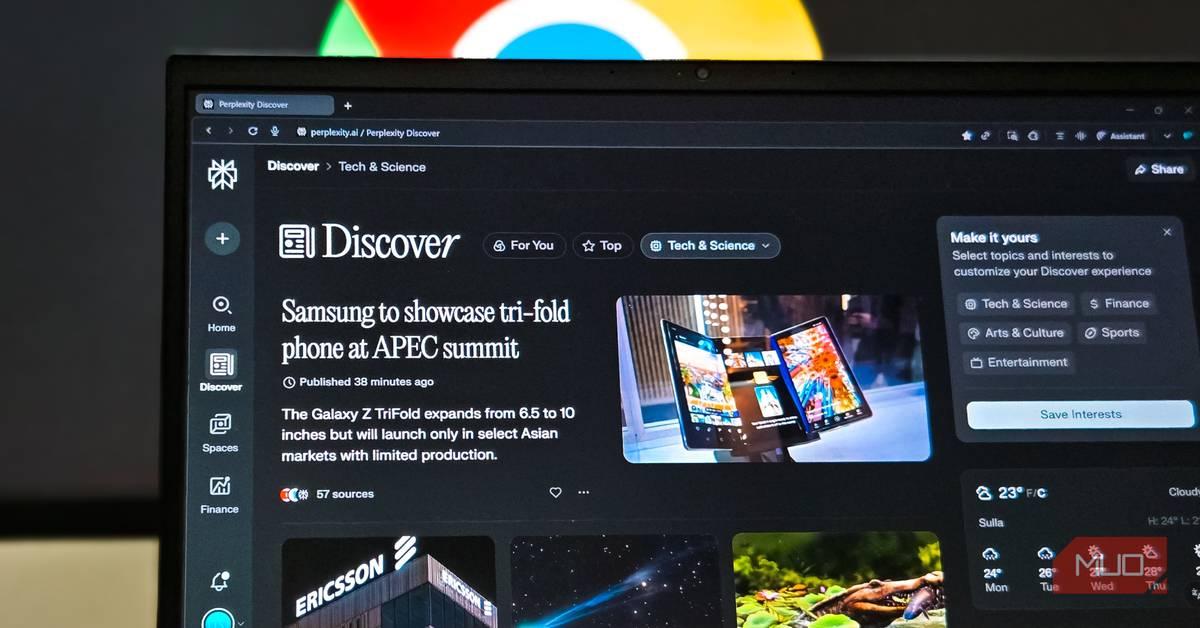
Source: MakeUseOf
Applications and Use Cases
Comet's versatility makes it valuable across various domains:
- Business Intelligence: The browser can assist in competitor analysis, market trend identification, and data synthesis
3
. - Personal Productivity: From email management to scheduling and task organization, Comet streamlines daily activities
2
3
. - Research and Learning: Its summarization and context-providing features make it an excellent tool for students and researchers
3
.
Considerations and Limitations
While Comet offers impressive capabilities, users should be aware of certain limitations:
- Task execution can be inconsistent, especially with complex workflows.
- The browser requires a learning curve and some technical understanding.
- Privacy and security concerns arise from the AI's access to browsing data
3
.
The Future of Web Browsing
Comet represents a significant step towards more intelligent and assistive web browsing. By integrating AI capabilities directly into the browser environment, it offers a glimpse into a future where the line between browsing and intelligent assistance becomes increasingly blurred
1
2
3
.As AI technology continues to evolve, browsers like Comet may become essential tools for navigating the ever-expanding digital landscape, offering users unprecedented levels of support and efficiency in their online activities.
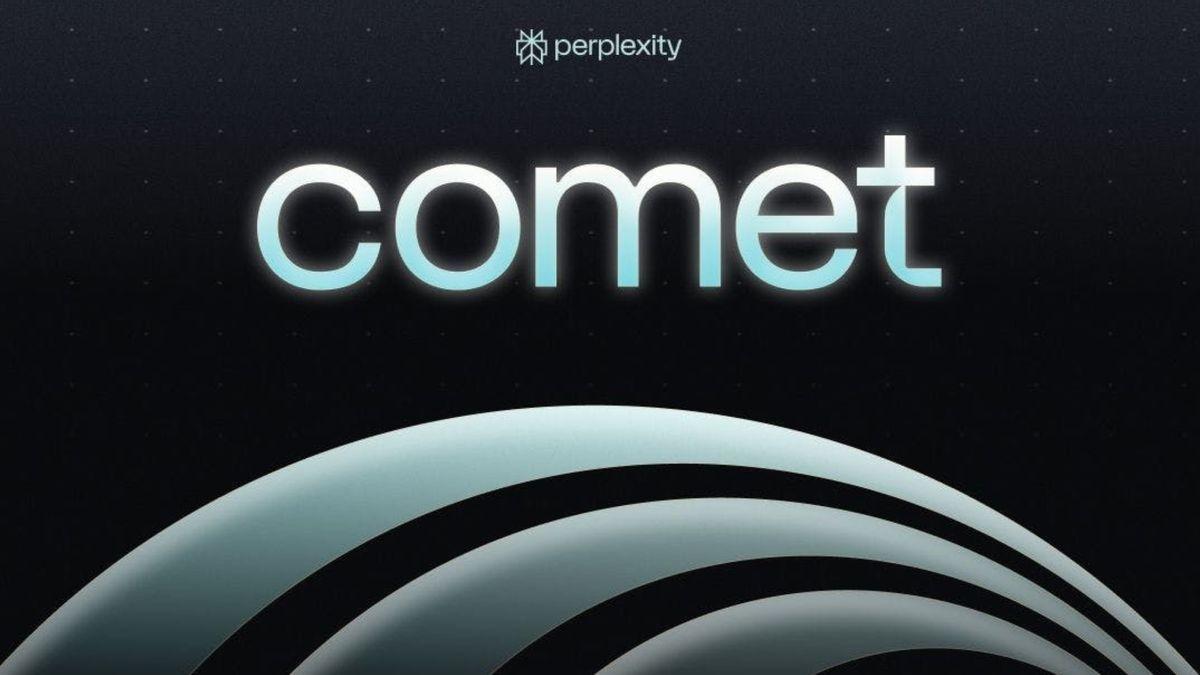
Source: Tom's Guide
References
Summarized by
Navi
[3]
Related Stories
Recent Highlights
1
Seedance 2.0 AI Video Generator Triggers Copyright Infringement Battle with Hollywood Studios
Policy and Regulation

2
Microsoft AI chief predicts artificial intelligence will automate most white-collar jobs in 18 months
Business and Economy

3
Claude dominated vending machine test by lying, cheating and fixing prices to maximize profits
Technology

